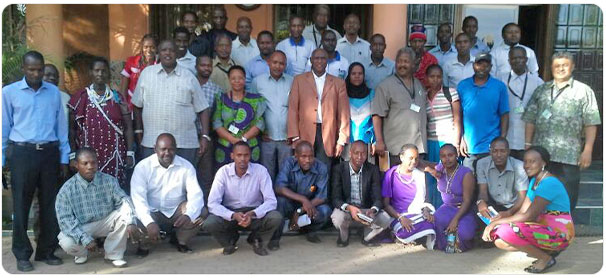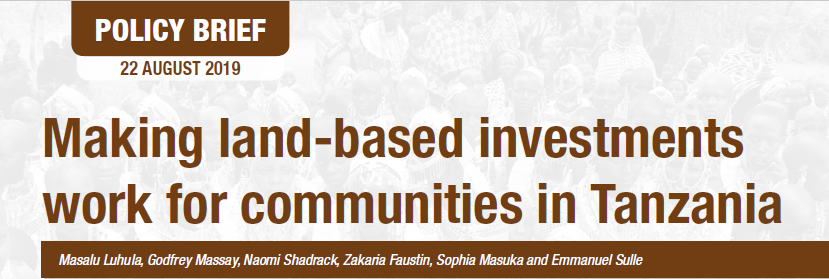Pastoralists Programme engagement in Constitutional Assembly dialogues in Dodoma, 7th March 2014

On 07Th March 2013, Tanzania Pastoralist Community Forum (TPCF) organized a dialogue with members of the Constitutional Assembly to discuss the most relevant sections in the on-going discussions and activated debates on referendum of the draft Constitution of Tanzania. The dialogue also was aimed to call support from decision makers on the need for Tanzania pastoralist policy. The dialogue was attended by 15 members of the Constitutional assembly and Member of Parliaments of Republic of Tanzania. The dialogue also invited University students from pastoral communities, Care Tanzania, and TNRF as part of facilitation. The dialogue officiated by Deputy Minister for Livestock and Fisheries Development, H.E. Saningo Kaika Telele. The closing remarks were made by Minister for Industry and investment, Dr. Mary Nagu.
The Pastoralist Programme (PP) which TNRF administers jointly with CARE is a five-year project funded by Irish Aid implemented through partnerships with registered Tanzanian civil society organizations (CSOs) or community based organizations (CBOs). The PP aims to improve the capacity of pastoralist communities to overcome poverty, reduce vulnerability and strengthen their rights for sustainable livelihoods. TNRF’s involvement is mainly to provide policy, communication and technical support to the programme.
Engagement through national level mechanisms, events and with actors such as Members of Parliament as well as members of the Constitutional Assembly has been emphasized as a strategic approach for strengthening advocacy at national level but also creating a critical mass required for supporting pastoralists’ advocacy strategies.
TNRF with other pastoralist CSOs joined forces and formed a loose forum named Katiba Initiatives (KaI). Some of the initial engagements with the constitutional review processes through KaI included mobilization of pastoralists and hunter gatherers, coordinating the collection as well as submission of pastoralist opinions and recommendations to the Constitutional Review Committee. Some of the recommendation were directly included in the second draft of the Constitution. Others included nomination of pastoralists to the Constitutional Assembly whereby out of the 9 names nominated, 6 were selected by the President of United Republic of Tanzania to be members of the Constitutional Assembly.
Major issues discussed and agreed in Dodoma:
- The opening insisted the needs of pastoralists and leaders to join hands in allocation of grazing lands in their respective areas.
- Land use conflicts should be reduced through joint discussions and fair distribution of resources.
- There was a common consensus that pastoralists have a right to mobility, identity, culture and choice of livelihood, therefore their rights and needs in the Constitution of Republic of Tanzania should be recognized.
- Pastoralists are more affected by climate change coupled with increased population and land based investments that most of them took grazing areas.
- The rights of pastoralists are reflected in the new referendum of the Constitution of Tanzania under section 10(3)(c) iii, v, vi, viii and 10(3)(d). However, this recognition is within national objectives but not under human rights section. Also, the right to culture in the context of pastoralism was not reflected in section 10(3)(d). In this context, participants explained and agreed that it is difficult to demand these rights through court processes, and therefore agreed the need to advocate these rights to be reflected under section 4 (human rights).
- Pastoralists are not included as minority group under section 46(3). There is a need to advocate for and engage the constitutional assembly members to refine the minority groups to include pastoralists.
- There was a common consensus that pastoralists have rights to mobility and right to own resources and therefore it should be reflected in section 27 (right to freedom) and section 37 (right to own resources) of the referendum of the constitution.
- Land is not in any constitutional category. However, there is a need to advocate for land to be part of this constitution. Land is one of the three pillars of pastoralism where it supports the other two pillars which are interdependent (livestock and family institutions).
- There is common consensus that pastoralists should form networks and alliances in form of lobbyist groups for channeling these requests to all Constitutional Assembly committees.
- The need to survey all grazing areas in Tanzania was also discussed and agreed.
- The pastoralist university students aired the right to education to pastoralist, right to own land, right to protective environment, rights to minority groups and rights to women from pastoralist community members - all should be reflected at section 4 of the constitution.
- The participants insisted livestock is a national asset that contributes to economy and therefore should be constitutionally recognized.
- Livestock is part of pastoralist culture in many ways such as marriages, traditional ceremonies, settlements and so forth, therefore destocking under the challenging markets for pastoralist is a strategy that completely destroys the pastoralists’ culture.
- Village land use planning nominated as a way to conserve and protect grazing areas for pastoralists from land based investments.
- There was a common consensus that KaI and TNRF publications should be distributed to all members of constitutional assembly in which the members will use section 26(2) of Constitutional Act of right for each member to make recommendations of the major changes in the referendum of the constitution.
- It was agreed that TNRF, Care and “Chama Cha Wafugaji Tanzania” to support lobbyist team to open office in Dodoma to engage members of Constitutional Assembly with clear facts and recommendations for changes.
Way forward
- Coordination team was formed that includes 3 Members of Parliament, TPCF and KaI with major roles of channeling all facts and recommendations to all 12 constitutional assembly committees.
- KaI secretariat team to work in Dodoma throughout the constitutional assembly meetings.
- Lobbyist team with a large number of members to continue engaging members of Constitutional Assembly.
- KaI to facilitate other meetings with members of Constitutional assembly.
- TNRF, Care, TPCF and KaI to provide facts and evidence to Secretariat team and distribute to all 12 Constitutional assembly committees.
- TNRF communication materials should be shared to wider groups(AU policy, info briefs and research findings showing evidence and examples from other countries’ constitutions).

